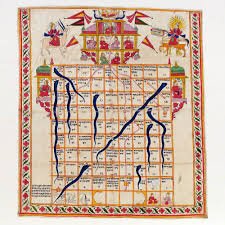The thirteenth century writer holy person Gyandev made the session of Snakes and Ladders. It was initially called 'Mokshapat'. The stepping stools in the diversion spoke to temperances and the snakes showed indecencies. The diversion was played with cowrie shells and dices. In time, the diversion experienced a few changes, however its importance continued as before, i.e. great deeds take individuals to paradise and shrewdness to a cycle of re-births.
Details:
Snakes and Ladders started in India as a feature of a group of dice table games, including pachisi (current Ludo). It was known as moksha pAtam or vaikunthapaali or paramapada sopaanam (the stepping stool to salvation
The diversion as prominently played in old India was known as Moksha Patam, and underscored the part of destiny or karma. A Jain adaptation, Gyanbazi, dates to the sixteenth century. The diversion was called Leela and mirrored the Hinduism awareness encompassing regular daily existence
Moksha Patam was related with conventional Hindu reasoning differentiating karma and kama, or fate and want. It stressed fate, rather than recreations, for example, pachisi, which concentrated on life as a blend of aptitude and luckiness. The diversion has likewise been translated and utilized as a device for educating the impacts of good deeds versus terrible. The stepping stools spoke to ethics, for example, liberality, confidence, and lowliness, while the snakes spoke to indecencies, for example, desire, outrage, murder, and robbery. The ethical quality lesson of the diversion was that a man can accomplish salvation (Moksha) through doing great, though by doing underhanded one will acquire resurrection to bring down types of life. The quantity of stepping stools was not as much as the quantity of snakes as an update that a way of good is considerably more hard to tread than a way of sins. Probably the number "100" spoke to Moksha (salvation). In Andhra Pradesh, snakes and steps is played for the sake of Vaikuntapali.
In the first amusement the squares of ethicalness are Faith (12), Reliability (51), Generosity (57), Knowledge (76), and Asceticism (78). The squares of bad habit or malevolence are Disobedience (41), Vanity (44), Vulgarity (49), Theft (52), Lying (58), Drunkenness (62), Debt (69), Rage (84), Greed (92), Pride (95), Murder (73), and Lust (99).
.jpg)
I upvoted your post pls upvote my post. https://steemit.com/crypto/@ashhad/same-rate-as-per-government-will-decide-on-trade-and-also-same-for-mining-but-after-deduction-of-depreciation